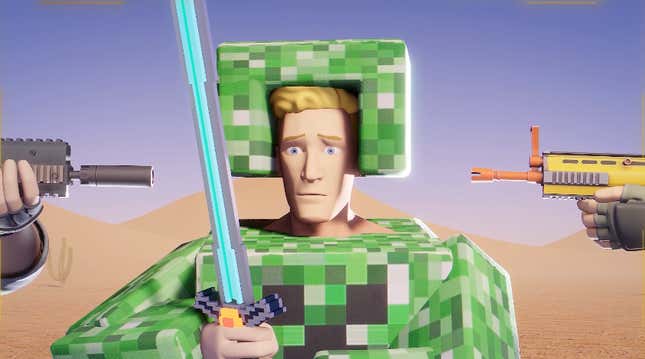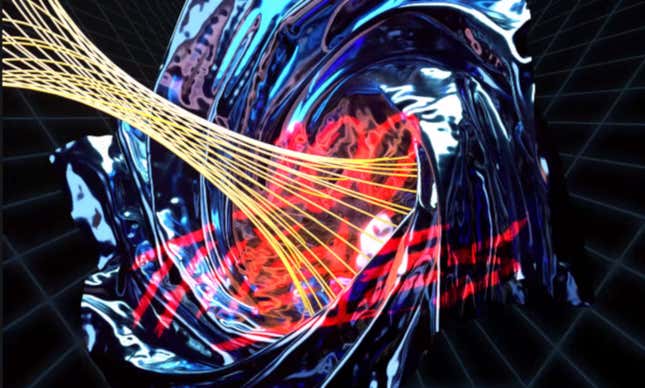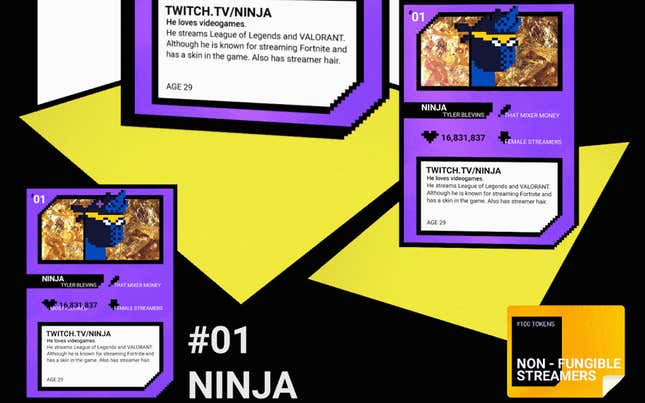
As of last month, the age of NFTs was officially upon us. As of this month, it might be on its way out. Average prices have declined by as much as 70% since a peak in February, according to Bloomberg. That, however, has not stopped big-name streaming and esports figures from announcing their own NFT collections.
This week, two video game lifestyle institutions, esports organization 100 Thieves and streaming superstar Turner “Tfue” Tenney, announced NFT collections. NFT, if you need a refresher, is short for “non-fungible token.” Thanks to blockchain technology, these cryptographic tokens are technically one of a kind, coming with a “proof of work” that says as much. Some have sold for millions of dollars. However, many people are selling NFTs of preexisting images and videos—things that you could simply download for free in JPG or GIF form, lending dubious value to the whole enterprise.
100 Thieves’ NFTs take the form of “unique artwork pieces” that focus on the organization’s logo, which also features prominently in its apparel line. Several 100 Thieves NFTs have already been auctioned off, with all of them going for between $4,500 and $6,200 worth of Ether, a popular cryptocurrency on the Ethereum blockchain. The rest are being given away to members of the organization’s community for the next 24 hours.
Tenney’s NFT set, the “NFTfue King of Gaming Collection,” went on sale yesterday evening. The animated art is a little higher-effort than 100 Thieves’ offering, depicting a digital Tenney as a character in settings based on Fortnite, Call of Duty, and Minecraft. The clips are cute and clever, making fun use of their looping format. Already, people have bid as much as $2,100 in Ether on them, though most copies are currently sitting at around $400. I just downloaded all of them as MP4s, to be able to say that I did.

There’s also a fourth “special edition” NFT that depicts the three digital Tenneys in a showdown against one another. The winner of that particular auction will also get to meet Tenney in Tampa, Florida for “an epic day filled with streaming, game play, vlogging, jet skiing and more.” It sounds like a dream come true for one of Tenney’s younger fans, but it’s unlikely that any of them will be able to afford it, given that somebody has already bid over $3,000 on the special edition NFT.
This follows NFTs from other esports figures like Conor “Diamondcon” Johst, a Call of Duty pro currently playing in Activision’s official Call of Duty League for the New York Subliners. Johst announced his NFT set last month and has since posted a video of a mockup, but it doesn’t appear to have gone on sale yet. Popular streamer Ben “ProfessorBroman” Bowman also released an NFT of a GIF of himself back in February. Of 50 copies, only one has sold, for about $20 worth of Ether.
The environmental impacts of NFTs (and the blockchain in general) are well-documented at this point, with artist and creative technologist Memo Akten finding that a single NFT—the sale of which often involves multiple transactions—can have a carbon footprint roughly equivalent to more than a month’s worth of electricity consumption for someone living in the EU. This has led to endless debate in the art and blockchain communities, as well as movements toward more sustainable NFT transactions.
Speaking to Kotaku, Tenney acknowledged the environmental concerns around NFTs and said that trying to reduce the toll they take was a big priority in the creation of his set.
“Unfortunately we live in a world where millions of tons of carbon dioxide emissions are being produced every year,” Tenney, who also noted that he’s been dabbling in crypto for about a year, said in an email. “Sadly this has been the case far prior to the NFT boom as well. That doesn’t mean we didn’t think about this when developing NFTfue and insisting as a team that we work with a carbon-neutral and -negative designer who takes pride in using renewable energy and technology in his creative process. I look up to people like Beeple who are taking the same measures and commend them for that.”
Kotaku also reached out to Johst and Bowman for more information on why they decided to make NFTs despite environmental concerns, but they did not reply. 100 Thieves declined to comment.
Some fans are not happy that the streamers and organizations they’ve followed for years are getting involved with NFTs.
“Not a fan,” one viewer said on Twitter in response to Tenney’s NFT announcement. “I hope you reconsider.”
“Just found out one of my favorite streamers supports NFTs. I’m going to fuckin lose it,” one fan, who is also an artist, tweeted in reference to Bowman’s stance on NFTs. In a DM to Kotaku, the fan added that their concerns stemmed from “the environmental impacts and also the fact that to me, at least, it’s so very clearly a scheme, because people are now losing a lot of money from it.”
Another issue with NFTs is that technically anybody can make an NFT out of anybody else’s work, rights or no rights. Right now, if you search various popular streamers’ names on NFT marketplace OpenSea, you’ll find numerous tokens that utilize their images. There is, for example, a whole set of “Non-Fungible Streamer” cards based on Tyler “Ninja” Blevins, Timothy “TimTheTatman” Betar, and the couple behind Girlfriend Reviews, Matt and Shelby. There are additional card sets that focus on different streamers as well. An NFT of the original Pogchamp emote is currently on sale for five Ether, or over $10,000. A simple pixelated piece based on Imane “Pokimane” Anys recently sold for about $100. There’s also an NFT of Anys “clapping after saying N-word.” And of course, there’s an NFT of her feet. Nobody has bid on those yet.
Some streamers, viewers, and even Twitch employees speculate that this is just the beginning.
“NFTs have the potential to disrupt subs and ads for monetization on all creator platforms,” Twitch senior manager of strategic partnerships in esports Jason Hitchcock, who told Kotaku he’s been in the crypto space since 2014, said on Twitter. “NFTs won’t just be art or clips. Viewers will buy membership tokens that unlock perks for being a member of the community and directly support the creator too. Possibilities are endless.”
In a DM to Kotaku, Hitchcock offered additional ideas: “Imagine: a creator sends a special token to everyone who owns 5 or more of their art NFTs, and this token grants the viewer access to a special Discord, a calendar of private super-fan events, and discounts on merch form their store.”
Others have suggested that emotes and other visual elements of the streaming ecosystem make sense as streamer-specific collectibles. These could, in turn, help streamers support themselves without Twitch taking a cut off the top. While some streamers have embraced this idea, many are not thrilled.
“Fuck right off,” said Twitch partner RadderssGaming in response to a question about NFTs’ future viability in streaming. “I’m trying to have a lesser impact on the environment than I already do.”
Twitch partner Breadwitchery, who replied to the same question by simply saying, “No, bad,” clarified her stance to Kotaku. “It’s yet another example of how we’re willing to destroy our planet if it means money, money, money,” she said in an email. “From my perspective, so many people get into NFTs to feel like they’re getting in on the bottom floor of a new crypto trend, with no mind for the damage it can do. The greenhouse gas emissions generated by NFTs are ridiculous. They’re inexcusable. I see the technological innovation behind it, I really do, but superimposed over that is just the greed of late-stage capitalism.”
Hitchcock agrees that environmental issues should be a major concern, but he still believes that there is potential in NFTs for esports orgs, streamers, and other industries.
“I understand the sentiment behind the environmental concerns,” he said. “Bitcoin mining does use a lot of energy. I think every industry needs to prioritize the environment while operating, too...At the end of the day, Ethereum is here to stay, is growing fast with a powerful network effect, and we’re seeing services that people are adopting like NFTs and Defi. The genie is out of the bottle, so if you’re truly interested in curbing the environmental impact of Ethereum and bitcoin, then you should become active in the community with your voice and energy to help these technologies become more efficient over the long term.”

Of course, if the NFT market continues to crater, little of this will matter in the long run. But if it stabilizes—as experts suggest it might—and big names like Tenney and 100 Thieves continue to buy in, ethical questions will become much more pressing, as will basic questions around whether or not people really care to buy NFTs of streamers and esports teams. In the art and sports worlds, celebrities have been able to make millions off NFTs, but lesser names haven’t fared quite so well. Will the same pattern repeat itself in streaming and esports? On top of that, esports itself possesses some bubble-like characteristics of its own. If NFTs also end up being a bubble, you’ve got a bubble within a bubble—not exactly a solid foundation from which to build.
Breadwitchery sees the appeal of an additional income source due to the overall inconsistency of streamer pay, but even then, she’s wary of streamers going all-in on NFTs.
“As a Twitch streamer, could NFTs help you make more money without a big business taking some of your revenue? Sure,” she said. “But you’re damaging the environment for profit just like that big business. You’re buying into the same corporate mindset as them; you just feel more individualistic about it, because you got yours.”
.